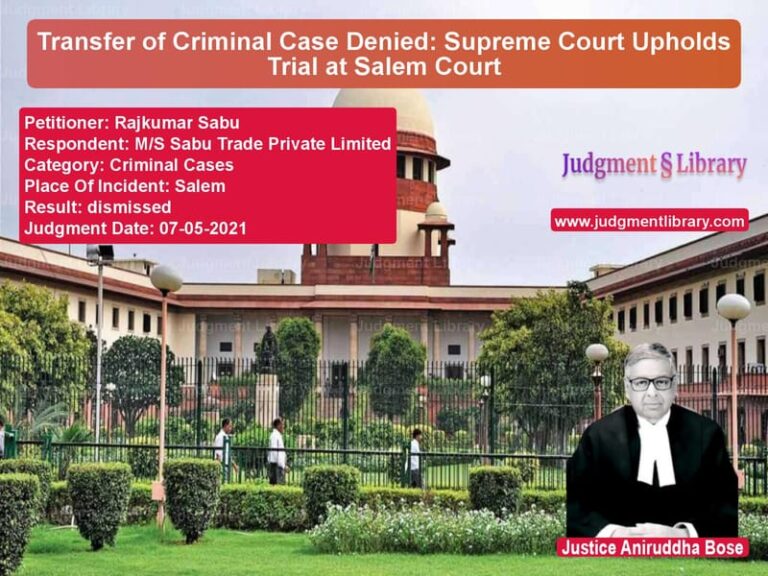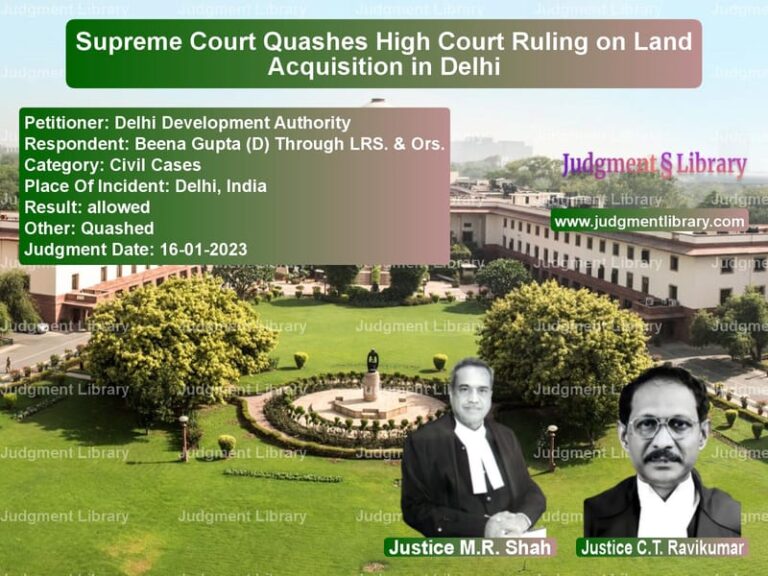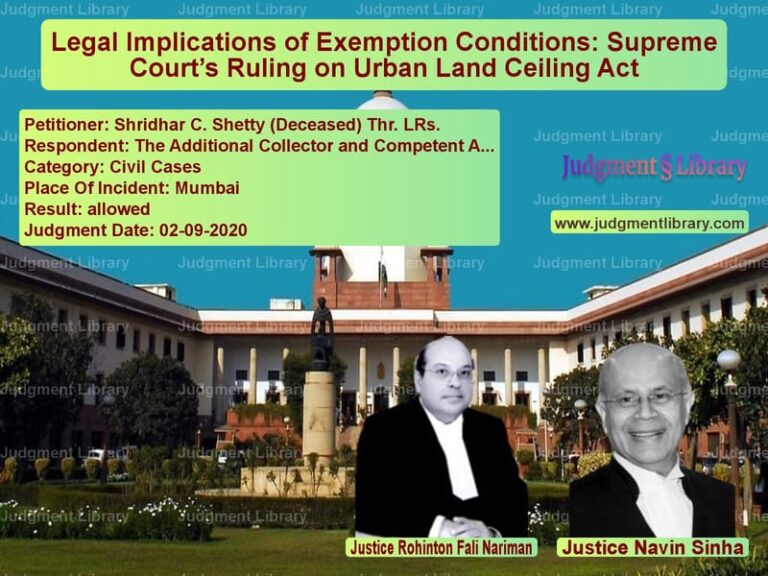Supreme Court Grants Bail in UAPA Case: Emphasizes Right to Speedy Trial
The Supreme Court of India recently ruled in Ashim Kumar Haranath Bhattacharya vs. National Investigation Agency, granting bail to the accused, who had been in custody for over nine years under the Unlawful Activities (Prevention) Act (UAPA), 1967. The Court emphasized that prolonged incarceration without a timely trial violates the constitutional right to liberty.
Background of the Case
The appellant, Ashim Kumar Haranath Bhattacharya, was one of the 14 accused in a case registered under UAPA, along with charges under the Arms Act, 1959 and the Explosive Substances Act, 1908. The case was initially lodged on March 1, 2012, under FIR No. 138/2012 and was later taken over by the National Investigation Agency (NIA).
The charge sheet was initially filed against five accused persons on August 23, 2012. A supplementary charge sheet was later filed against four additional accused, including the appellant, on December 27, 2012. The charges were framed on June 20, 2019, seven years after the first charge sheet was filed.
The appellant was arrested on July 6, 2012, based on a production warrant issued while he was lodged in Nagpur Central Jail in another case. He had already been acquitted in that case in February 2014. However, despite his acquittal, he continued to be incarcerated under the present case.
Legal Issues Raised
- Whether prolonged incarceration of the accused without completing the trial violates fundamental rights under Article 21 of the Constitution.
- Whether Section 43-D(5) of the UAPA, which restricts bail, could be relaxed considering the excessive delay in trial.
- Whether granting bail would pose a security threat.
Petitioner’s Arguments (Ashim Kumar Haranath Bhattacharya)
- The petitioner argued that he had been in custody for more than nine years without any finality in trial.
- Out of the 298 prosecution witnesses listed in the charge sheet, the prosecution had only indicated its intention to examine 100 to 105 witnesses, further delaying the trial.
- The petitioner relied on the Supreme Court’s ruling in Union of India vs. K.A. Najeeb (2021), which held that prolonged detention without a speedy trial justified bail, even under stringent laws like UAPA.
- The petitioner highlighted that he was 74 years old and suffered from multiple health issues.
- He argued that no incriminating evidence had been proven against him in court.
Respondent’s Arguments (National Investigation Agency – NIA)
- The prosecution opposed bail, stating that the charges were of a serious nature, involving acts of terrorism.
- They contended that the delay was not attributable to the prosecution but to the complexity of the case.
- The NIA urged the Court to direct the trial to be conducted on a day-to-day basis instead of granting bail.
- They emphasized that under Section 43-D(5) of the UAPA, bail could only be granted in exceptional circumstances.
Supreme Court’s Verdict
The Supreme Court, in a bench comprising Justices Ajay Rastogi and Abhay S. Oka, ruled in favor of granting bail to the accused. The Court emphasized that while stringent laws like UAPA are necessary, their application must be balanced with constitutional rights.
Read also: https://judgmentlibrary.com/supreme-court-dismisses-review-petition-in-criminal-case-no-error-found/
The Court observed:
“Deprivation of personal liberty without ensuring a speedy trial is not consistent with Article 21 of the Constitution. While deprivation of liberty for some period may be unavoidable, it cannot be unduly long.”
Key Observations by the Supreme Court
- The Court reaffirmed that while the UAPA imposes restrictions on bail, constitutional courts retain the power to intervene in cases of excessive delay.
- The delay in framing charges and the prolonged incarceration of the accused violated the principle of a speedy trial.
- The Court held that it was not reasonable to keep an undertrial prisoner behind bars for over nine years without completing the trial.
- The NIA’s claim that the trial would be expedited was inconsistent with the reality of the case, where only one hearing per month was taking place.
The Supreme Court ruled:
“In the present case, there is no likelihood of the trial being completed within a reasonable period, and the period of incarceration already undergone has exceeded a substantial part of the prescribed sentence. The appellant has made out a case for bail.”
Final Order
- The Supreme Court allowed the appeal and granted bail to the accused.
- The accused was directed to be released within three days, subject to appropriate conditions imposed by the trial court.
- The trial court was directed to conduct further proceedings on a priority basis.
Key Takeaways
- Speedy trial is a fundamental right: The ruling reaffirms that courts must balance national security concerns with individual rights.
- UAPA bail restrictions are not absolute: The Supreme Court clarified that excessive delay could justify bail under exceptional circumstances.
- Judicial oversight of special laws: Courts must ensure that anti-terror laws are applied fairly without violating constitutional protections.
- Prisoners’ rights must be safeguarded: A person cannot be indefinitely detained as an undertrial without significant progress in trial.
This landmark judgment highlights the importance of upholding constitutional liberties while ensuring national security concerns are addressed through fair legal procedures.
Petitioner Name: Ashim Kumar Haranath Bhattacharya.Respondent Name: National Investigation Agency.Judgment By: Justice Ajay Rastogi, Justice Abhay S. Oka.Place Of Incident: India.Judgment Date: 30-11-2021.
Don’t miss out on the full details! Download the complete judgment in PDF format below and gain valuable insights instantly!
Download Judgment: ashim-kumar-haranath-vs-national-investigati-supreme-court-of-india-judgment-dated-30-11-2021.pdf
Directly Download Judgment: Directly download this Judgment
See all petitions in Bail and Anticipatory Bail
See all petitions in Terrorist Activities
See all petitions in Custodial Deaths and Police Misconduct
See all petitions in Judgment by Ajay Rastogi
See all petitions in Judgment by Abhay S. Oka
See all petitions in allowed
See all petitions in supreme court of India judgments November 2021
See all petitions in 2021 judgments
See all posts in Criminal Cases Category
See all allowed petitions in Criminal Cases Category
See all Dismissed petitions in Criminal Cases Category
See all partially allowed petitions in Criminal Cases Category







